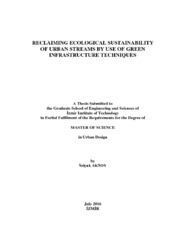Please use this identifier to cite or link to this item:
https://hdl.handle.net/11147/2844Full metadata record
| DC Field | Value | Language |
|---|---|---|
| dc.contributor.advisor | Saygın, Nicel | en_US |
| dc.contributor.author | Aksoy, Selçuk | - |
| dc.date.accessioned | 2017-01-24T12:51:47Z | |
| dc.date.available | 2017-01-24T12:51:47Z | |
| dc.date.issued | 2016-07 | |
| dc.identifier.citation | Aksoy, S. (2016). Reclaiming ecological sustainability of urban streams by use of green infrastructure techniques. Unpublished master's thesis, İzmir Institute of Technology, İzmir, Turkey | en_US |
| dc.identifier.uri | http://hdl.handle.net/11147/2844 | |
| dc.description | Thesis (Master)--Izmir Institute of Technology, Urban Design, İzmir, 2016 | en_US |
| dc.description | Includes bibliographical references (leaves: 151-161) | en_US |
| dc.description | Text in English; Abstract: Turkish and English | en_US |
| dc.description | xii,161 leaves | en_US |
| dc.description.abstract | Ecological sustainability of urban streams has been significantly reversed from the last quarter of the 20th century onwards. This reverse has occurred as a result of increasing urbanisation and human activity, including construction in floodplain areas, relocation and culverting of streams, channelization, riparian clear-cut, and discharge of wastewater into streams. However, on comprehending the significance of urban streams, ecologically-based stream rehabilitation projects have been preferred to hard engineering solutions. These rehabilitation projects not only restore stream ecosystems but also reclaim their contribution to urban landscapes through the provision of ecological, social, and cultural assets. Based on the above, this study sets out to examine urban stream rehabilitation in the context of sustainable water management. In that regard, this research suggests an integrated and holistic approach through green infrastructure tools which can compensate for misguided human interventions on nature, and reclaim ecological sustainability of urban streams and their environs. In line with ecological sustainability, best practices from various countries and the case study of the research evidenced how the degraded stream ecosystem could be rehabilitated by using green infrastructure techniques. The research methodology used in the study involves analysis of the theoretical literature on green infrastructure and stream rehabilitation, best practice analysis, and case study analysis to develop a rehabilitation guideline for Arap Stream and its surroundings. In this sense, the research presents urban-scale, district-scale and neighbourhood-scale rehabilitation strategies for the case study. Finally, the study delivers the rehabilitation plan for Arap Stream that includes in-stream and green infrastructure techniques. | en_US |
| dc.description.abstract | Kentsel akarsular, son yıllarda yanlış müdahalelere maruz kalarak ekolojik işlevselliklerini yitirmişlerdir. Taşkın alanlarındaki yerleşimlere tehdit oluşturmaması açısından kentsel akarsuların güzergâhları değiştirilmiş, beton kanallara alınmış veya yer altına alınarak “ıslah” edilmişlerdir. Akarsu ekosistemlerinin zarar görmesi yalnızca ekolojiyi tahrip etmemiş, ayrıca kent kimliklerinin ve değerlerinin de yitirilmesine sebep olmuştur. Zaman içerisinde yapılan müdahalelerin daha yıkıcı etkilere sebep olduğunun anlaşılması ile akarsuların ekolojik rehabilitasyonu tüm dünyada gündeme gelmiştir. Bu yaklaşım akarsuların yalnızca ekosistemini iyileştirmemiş, aynı zamanda kent peyzajına da önemli katkı sağlamıştır. Bu çalışma, sürdürülebilir su yönetimi çerçevesinde kentsel akarsuların ekolojik ıslahını ele almaktadır. Bu bağlamda, çalışma yeşil altyapıyı bir araç olarak kullanıp kentsel akarsularda yanlış müdahalelerin etkisini azaltan ve aynı zamanda akarsu ıslahını sağlayan bütüncül ve entegre bir anlayışı ön plana çıkarmaktadır. Çalışma farklı ülkelerde uygulanmış pek çok başarılı örneğin yanı sıra, Arap Deresi ve çevresi için hazırlanan ıslah projesini de sunarak bu sorunlara nasıl çözüm getirilebileceğini ortaya koymaktadır. Çalışmada kullanılan metoda göre, ilk olarak teorik literatür değerlendirilmiş, daha sonra uygulanmış projeler irdelenmiş ve en son Arap Deresi ve çevresinin analizi yapılmıştır. Tüm elde edilen bulgular ile Arap Deresi ve çevresi için şehir, bölge ve mahalle ölçeğinde ilkeler geliştirmiştir. Çalışma aynı zamanda bu yeşil altyapı temelli ilkeleri kullanarak hazırladığı öneri projesini sunmaktadır. | en_US |
| dc.language.iso | en | en_US |
| dc.publisher | Izmir Institute of Technology | en_US |
| dc.rights | info:eu-repo/semantics/openAccess | en_US |
| dc.subject | Stream rehabilitation | en_US |
| dc.subject | Green infrastructure | en_US |
| dc.subject | Arap stream | en_US |
| dc.subject | Ecological sustainability | en_US |
| dc.subject | Sustainable water management | en_US |
| dc.title | Reclaiming ecological sustainability of urban streams by use of green infrastructure techniques | en_US |
| dc.title.alternative | Yeşil altyapı teknikleri kullanımı ile kentsel akarsuların ekolojik sürdürülebilirliğin yeniden sağlanması | en_US |
| dc.type | Master Thesis | en_US |
| dc.institutionauthor | Aksoy, Selçuk | - |
| dc.department | Thesis (Master)--İzmir Institute of Technology, City and Regional Planning | en_US |
| dc.relation.publicationcategory | Tez | en_US |
| item.languageiso639-1 | en | - |
| item.fulltext | With Fulltext | - |
| item.openairecristype | http://purl.org/coar/resource_type/c_18cf | - |
| item.openairetype | Master Thesis | - |
| item.grantfulltext | open | - |
| item.cerifentitytype | Publications | - |
| Appears in Collections: | Master Degree / Yüksek Lisans Tezleri Sürdürülebilir Yeşil Kampüs Koleksiyonu / Sustainable Green Campus Collection | |
Files in This Item:
| File | Description | Size | Format | |
|---|---|---|---|---|
| T001478.pdf | MasterThesis | 17.91 MB | Adobe PDF |  View/Open |
CORE Recommender
Page view(s)
236
checked on Jul 22, 2024
Download(s)
248
checked on Jul 22, 2024
Google ScholarTM
Check
Items in GCRIS Repository are protected by copyright, with all rights reserved, unless otherwise indicated.